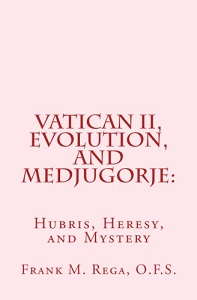
The Hubris of Vatican II
According to the Council, man is the only creature on earth that "God willed for itself."
| This seemingly innocuous statement is
found in Vatican II's Gaudium et Spes. But prouncements of this type stand
condemned under a formal anathema, pronounced at Vatican I, since they deny that God
created all things for Himself and His glory. Nothing in the universe was
created for its own sake. This condemned proposition has made its way into the Catechism of the Catholic Church, and is used to justify the man-centered post-Conciliar "new theology." It is one of the building blocks of John Paul II's thesis of Universal Salvation, and of his Theology of the Body. |
||
by Frank Rega
| It is common, even among Traditionalist Catholic defenders
of Vatican II, to assert that the Council documents in themselves contain no formal error
or heresy. It is often asserted that the Holy Spirit guided its pronouncements and
prevented any heterodoxy, even though as a pastoral rather than dogmatic Council, it was
not under the seal of infallibility. In view of the prolonged crisis in the Church, optimistic statements of this type should not be taken for granted. Rather, they ought to be questioned in light of the renewed call for a serious critical discussion of the Council proposed by Msgr. Brunero Gherardini, and reported in recent issues of The Remnant (1), and The Angelus (2, 3). To heed this call in a meaningful manner entails questioning the Council at a deeper – perhaps more unpleasant – level, has hitherto been done by Traditionalists. Specifically, hard truths must be faced regarding the heterodoxy of certain statements set forth in the Conciliar documents, without however embarking on the path of sedevacantism. If necessary, a heresy must be openly branded a heresy, rather than labeled a theological error, falsehood, untruth, pastoral expression, ambiguity or other similar term that dances around the elephant in the room. For example, what is to be made of the below pronouncement in Gaudium et Spes, 24:3, affirming that that man is the only creature on earth that God willed for itself? Divine Revelation, on the contrary, states that God made all things for Himself (Proverbs 16:4).
This same statement from GS 24:3 is directly quoted within the Catechism of the Catholic Church, officially promulgated in its 1997 Latin edition by John Paul II:
Pope John Paul II himself, in a speech before a General Audience, expounded on GS 24:3, concluding that man "is an end in itself."
|
Read the complete article in the below book, available in print or Kindle format.
Frank M. Rega is the author of:
Padre
Pio and America,
St.
Francis of Assisi and the Conversion of the Muslims,
The
Greatest Catholic President: Garcia Moreno of Ecuador
The
Truth about Padre Pio's Stigmata and Other Wonders of the Saint
Vatican II, Evolution, and Medjugorje: Hubris, Heresy, and Mystery
Life of the Mystic Luisa
Piccarreta - Journeys in the Divine WIll - volume 3 in preparation
www.frankrega.com www.sanpadrepio.com www.thepoverello.com www.lifeofluisa.com
This
page was last updated on 01/10/16